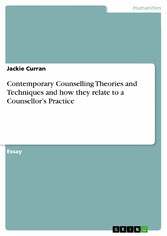Search and Find
Service
Contemporary Counselling Theories and Techniques and how they relate to a Counsellor's Practice
More of the content

Contemporary Counselling Theories and Techniques and how they relate to a Counsellor's Practice
Essay from the year 2015 in the subject Psychology - Consulting and Therapy, grade: 70, University of Cumbria, course: Psychology with Counselling, language: English, abstract: All counselling approaches may require a basis in theory, particularly person-centred counselling which seems to necessitate a practitioner to have strong theoretical acumen to be successful. There seems to be a large disparity and diversity in individuals who receive counselling, therefore it may be appropriate to retain an applicable knowledge of theory. This knowledge can be selected and applied as and when it is deemed suitable by the counsellor. Boy and Pine claim that theory provides a framework, as well as relatedness and unity of information and it allows one to see important client details that may otherwise be overlooked through a more rudimentary approach. Theory may facilitate a logical direction for a developing Counsellor, helping them to focus on relevant information, and provides guidelines for treatment. It is important to know and understand the theory of counselling therapy as it forms the 'skeleton' of counselling practice, with the skills and relationship with clients being the 'meat on the bones.' If the counsellor can understand the theory and the rationale behind it then they can be enact it in their practice. It will aid counsellors to focus and be able to be organised in their thoughts. Theory enables the practitioner to build and sustain a rapport with clients. It also helps to challenge Counsellors to be innovative and compassionate within the professional relationship. It may also act as an evaluation tool for the counsellor to measure their practice and develop professionally.
All prices incl. VAT











